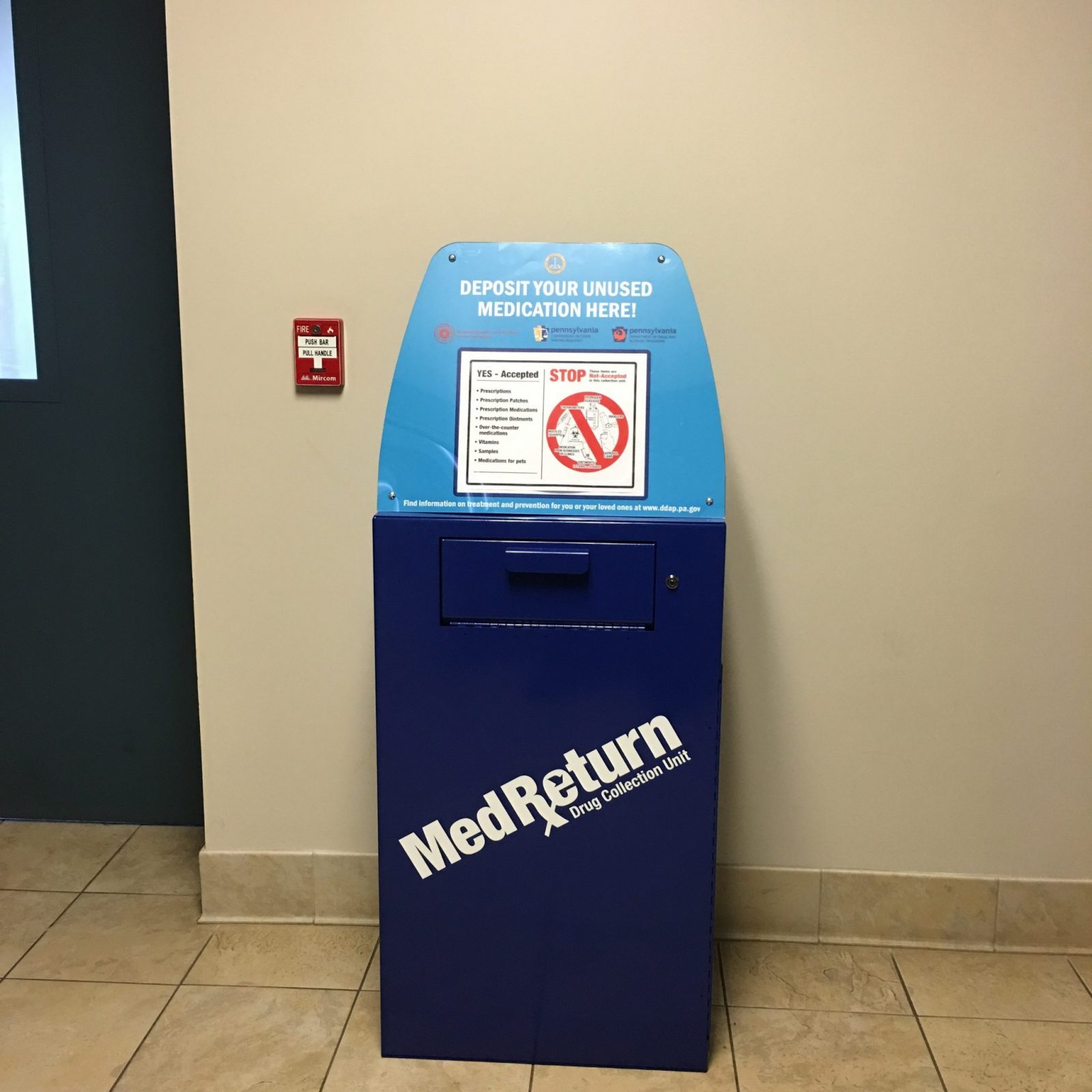 TAKING BACK UNWANTED PRESCRIPTION DRUGS
TAKING BACK UNWANTED PRESCRIPTION DRUGS
Always available… Easy to use… Safe… Every day
1020 Lebanon Road, West Mifflin, Police Lobby
West Mifflin, Allegheny County Pennsylvania – On Friday April 1, 2016 West Mifflin Police in cooperation with the Pennsylvania District Attorneys Association, Allegheny County District Attorney’s Office The Department of Drug and Alcohol Programs (DDAP), the Pennsylvania Commission on Crime and Delinquency (PCCD) and the Drug Enforcement Administration (DEA) Implemented a Prescription Drug Take-Back program.
The Prescription Drug Take-Back Program focuses on alleviating the health and safety concerns from the diversion and abuse of prescription medications by helping our communities properly dispose of unused prescription medications. Come in, drop it in the box and leave, anytime, no questions ask.
 Prescription drug misuse, abuse and overdose are growing concerns across the nation. According to a 2011 survey in Pennsylvania, 14 percent of youth surveyed admitted to taking prescription drugs that were not prescribed to them and 18 percent felt that prescription drugs were not harmful. Medicines that languish in home cabinets are highly susceptible to diversion, misuse, and abuse. Rates of prescription drug abuse in the U.S. are alarmingly high, as are the number of accidental poisonings and overdoses due to these drugs. Studies show that a majority of abused prescription drugs are obtained from family and friends, including from the home medicine cabinet. In addition, Americans are now advised that their usual methods for disposing of unused medicines—flushing them down the toilet or throwing them in the trash—both pose potential safety and health hazards.
Prescription drug misuse, abuse and overdose are growing concerns across the nation. According to a 2011 survey in Pennsylvania, 14 percent of youth surveyed admitted to taking prescription drugs that were not prescribed to them and 18 percent felt that prescription drugs were not harmful. Medicines that languish in home cabinets are highly susceptible to diversion, misuse, and abuse. Rates of prescription drug abuse in the U.S. are alarmingly high, as are the number of accidental poisonings and overdoses due to these drugs. Studies show that a majority of abused prescription drugs are obtained from family and friends, including from the home medicine cabinet. In addition, Americans are now advised that their usual methods for disposing of unused medicines—flushing them down the toilet or throwing them in the trash—both pose potential safety and health hazards.
Dangers of Improper Prescription Disposal
- Almost all prescription drugs involved in overdoses are originally prescribed by physicians
- Prescription drug abuse has quadrupled in the past ten years; it now results in more deaths than all illicit street drugs combined.
- Prescription drug abuse is growing among adolescents in Pennsylvania: 13 percent of high school-aged children have abused opioid pain relievers, 6 percent tranquilizers, and 12 percent amphetamines (Adderall and Ritalin)
- Improper disposal of prescription drugs could create environmental hazards impacting groundwater and ivers and harming wildlife.
Preparing items for disposal at a Take-Back Box location
- All pharmaceutical drugs that are being disposed of need to be in a sealed container such as the original bottle or a zip-lock bag.
- Liquid pharmaceuticals should remain in the original container.
- Personal information should be removed or blotted out with a permanent marker.
Items Accepted
- Prescription and over-the-counter solid medications
- Tablets and capsules
- Pet medicines
Items NOT Accepted
- Intravenous solutions
- Injectables, syringes, and needles (i.e. EpiPens)*
- These items should be taken to a health care professional’s office or to a hospital for proper disposal.
- Hydrogen peroxide
- Compressed cylinders or aerosols (e.g., asthma inhalers)
- Iodine-containing medications
- Thermometers
- Alcohol & illicit drugs (i.e. marijuana, heroin, LSD, etc.)
It should be noted that on April 30, 2016 from 10 a.m. to 2 p.m. the Drug Enforcement Administration (DEA) will give the public its 11th opportunity in six years to dispose prescription drugs. The West Mifflin program works with and additionally to this program. The service is free and anonymous, no questions asked.
If you need assistance in finding a treatment provider or funding for addiction treatment, please contact your
county drug and alcohol office or call the Pennsylvania Department of Drug & Alcohol Programs at 717-783-8200


